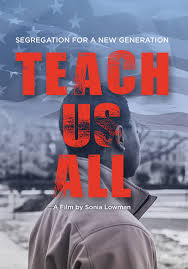Difference between revisions of "Teach Us All"
| Line 1: | Line 1: | ||
| − | Teach Us All is a documentary and social | + | Teach Us All is a documentary and social equity crusade on educational inequality set against the setting of the 1957 Little Rock school crisis. Sixty years after the Little Rock Nine confronted brutal obstruction while integrating Central High in Arkansas, America's schools keep on addressing the important landmark of the Civil Rights Movement. Teach Us All demonstrates exhibits amazing exercises from history inside an opportune setting, accentuating the requirement for solidarity and aggregate activity to correct the differences among America's kids. |
"Teach Us All" explores hyper-segregated schools around the country where at least 75% of students are of the same race. | "Teach Us All" explores hyper-segregated schools around the country where at least 75% of students are of the same race. | ||
[[File:Teach us all.jpg|Cover of Teach Us All documentary movie|thumb|right]] | [[File:Teach us all.jpg|Cover of Teach Us All documentary movie|thumb|right]] | ||
==Plot== | ==Plot== | ||
| − | + | Following the watershed Supreme Court case Brown v. Board of Education, in September 1957, a group of African-American understudies known as the Little Rock Nine valiantly endeavored to oppose the thought that skin tone ought to decide instructive access by incorporating an all-white southern high school. Almost 60 years after the “Little Rock Crisis,” inequality in access to quality education stay among the most urgent civil rights issues of our time. With its school locale hanging in the balance following a state takeover in January 2015, contemporary Little Rock presents a microcosm of the inequities and difficulties showing in study halls the whole way across America, which is seeing a re-isolation of its schools. | |
| − | |||
| − | |||
==Messages== | ==Messages== | ||
| − | The film is | + | The film is is coordinated in three collaborative subjects: the teacher’s part in impacting young people’s lives, the requirement for local area commitment for school achievement, and the force of the understudies who will be charged with the fight for their right to education equity. Through contextual analyses in Little Rock, New York City, and Los Angeles, Teach Us All tries to offer the basic exercises of history as a powerful influence for the present status of US education and investigate: after 60 years, how far have US instruction come – or not come – and what would be an ideal next step? <ref>[https://www.civilrightsmuseum.org/teach-us-all Teach Us All]. National Civil Rights Museum. Retrieved January 13 2021.</ref> |
| − | While the tragic message of the documentary is that, | + | While the tragic message of the documentary is that, especially over the most recent 30 years, segregation in American schools has gotten much worse -- with a lot of dampening measurements to back it up - the narrative likewise investigates the positive good examples before (like the Little Rock Nine) and in the current who are attempting to achieve enduring change and variety in the classroom. <ref>Costello,Brian.[https://www.commonsensemedia.org/movie-reviews/teach-us-all Teach Us All]. Common Sense Media. REtrieved January 13 2021</ref> |
==References== | ==References== | ||
{{reflist}} | {{reflist}} | ||
[[Category:Anti-Black Racism in Documentary Movies]] | [[Category:Anti-Black Racism in Documentary Movies]] | ||
Latest revision as of 14:54, 5 March 2021
Teach Us All is a documentary and social equity crusade on educational inequality set against the setting of the 1957 Little Rock school crisis. Sixty years after the Little Rock Nine confronted brutal obstruction while integrating Central High in Arkansas, America's schools keep on addressing the important landmark of the Civil Rights Movement. Teach Us All demonstrates exhibits amazing exercises from history inside an opportune setting, accentuating the requirement for solidarity and aggregate activity to correct the differences among America's kids. "Teach Us All" explores hyper-segregated schools around the country where at least 75% of students are of the same race.
Plot
Following the watershed Supreme Court case Brown v. Board of Education, in September 1957, a group of African-American understudies known as the Little Rock Nine valiantly endeavored to oppose the thought that skin tone ought to decide instructive access by incorporating an all-white southern high school. Almost 60 years after the “Little Rock Crisis,” inequality in access to quality education stay among the most urgent civil rights issues of our time. With its school locale hanging in the balance following a state takeover in January 2015, contemporary Little Rock presents a microcosm of the inequities and difficulties showing in study halls the whole way across America, which is seeing a re-isolation of its schools.
Messages
The film is is coordinated in three collaborative subjects: the teacher’s part in impacting young people’s lives, the requirement for local area commitment for school achievement, and the force of the understudies who will be charged with the fight for their right to education equity. Through contextual analyses in Little Rock, New York City, and Los Angeles, Teach Us All tries to offer the basic exercises of history as a powerful influence for the present status of US education and investigate: after 60 years, how far have US instruction come – or not come – and what would be an ideal next step? [1] While the tragic message of the documentary is that, especially over the most recent 30 years, segregation in American schools has gotten much worse -- with a lot of dampening measurements to back it up - the narrative likewise investigates the positive good examples before (like the Little Rock Nine) and in the current who are attempting to achieve enduring change and variety in the classroom. [2]
References
- ↑ Teach Us All. National Civil Rights Museum. Retrieved January 13 2021.
- ↑ Costello,Brian.Teach Us All. Common Sense Media. REtrieved January 13 2021
